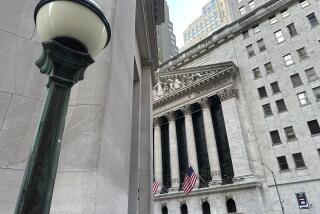Treasury Yields Continue to Drop
Treasury bond yields fell Monday to new eight-month lows, continuing the slide triggered by Friday’s weak February employment report.
The stock market also was rattled, particularly shares of big technology companies whose fortunes are tied to the outlook for business spending. The Nasdaq 100 index, dominated by tech giants, slumped to its lowest level since Dec. 22. Blue-chip stocks were down modestly.
Falling bond yields often suggest that investors expect the economy to weaken. But the latest drop may be less about the economy overall than about the job market specifically, some analysts say.
A common view on Wall Street is that the jobs data so far are understating the strength in business and consumer activity. Employment may be the last burner to ignite in the economy, but it will happen eventually, said Thomas McManus, investment strategist at Banc of America Securities in New York.
“I think the jobs are going to show up,” he said. Lousy weather in much of the nation may have helped to limit employment gains this winter, he said, but “the worse the winter is, the more likely the job gains will come to pass” in spring.
In the meantime, investors who are snapping up bonds at current yields may be doing so more for technical reasons than based on the economy, McManus and some other analysts say.
Even if consumer and business spending continue to rise, many bond traders are betting that the Federal Reserve won’t begin to tighten credit until the nation has racked up many months of job growth, said Joseph Carson, economist at Alliance Capital Management in New York.
So for now, with the Fed’s key short-term rate at 1%, professional investors can profit by borrowing at or near that rate and buying longer-term bonds paying higher yields.
On Monday, the yield on the 10-year Treasury note -- a benchmark for mortgage rates -- dropped to 3.77% from 3.85% on Friday as investors rushed to buy. The yield now is the lowest since mid-July.
The three-year Treasury note yield slid to 1.92% from 2.01% on Friday, the first time it has been below 2% since October. The yield was at 2.3% at year’s end.
Long-term investors are unlikely to consider current yields appealing, but “the bond trader is doing very well in this environment,” said Tad Rivelle, chief investment officer at Metropolitan West Asset Management in Los Angeles.
Other technical factors also are driving money into government bonds, pushing yields lower, analysts say. Asian central banks, for example, have been aggressively buying Treasury bonds in the last year in an attempt to bolster the dollar. The buck’s slide has hurt foreign exporters by raising the cost of their goods for U.S. buyers.
In the stock market, major tech shares bore the brunt of the selling on Monday, as they have for much of the last month or so. The Nasdaq 100 index, which includes such giants as Microsoft, Cisco Systems and Intel, dropped 31.87 points, or 2.2%, to 1,441.12. That left it down 1.8% year to date.
Most other key indexes still are positive for the year. The broader Nasdaq composite fell 38.85 points, or 1.9%, to 2,008.78 on Monday, and is clinging to a 0.3% gain year to date.
Losers outnumbered winners by 2 to 1 on Nasdaq, but the margin was about 5 to 4 on the New York Stock Exchange.
The Dow Jones industrial average lost 66.07 points, or 0.6%, to 10,529.48, and is up 0.7% this year. The Standard & Poor’s 500 index was off 9.66 points, or 0.8%, to 1,147.20 and has a 3.2% gain year-to-date.
If the economy is faring much better than the employment data suggest, then the stock market shouldn’t suffer more than a hiccup in the near term, said Kevin Marder, chief market strategist at Ladenburg Thalmann Asset Management in Los Angeles.
But the recent trend in share prices indicates that some investors are looking to reduce the risk in their portfolios in case the economy wanes, he said.
Bigger technology companies are heavily dependent on the outlook for business spending overall, which is why nervous investors may be trimming their holdings in that group, Marder said.
But even if the economy slows, many smaller companies in niche markets of technology and other industries might still prosper, he said.
While big Nasdaq names are suffering, the Nasdaq biotechnology stock index is up 10.5% this year. Standard & Poor’s index of 600 small-company stocks is up 6.3%.
Demand for many Internet stocks also remains relatively strong. The Interactive Week index of 45 Net-related shares lost 1.4% on Monday, less than the broader Nasdaq composite. So far this year the Internet index is up 3.9%.
The bond market rally also may be helping the small-stock sector: Historically, falling rates have been particularly bullish for smaller shares, Marder said.
Banc of America’s McManus noted that investors have been pulling back from heavy-industry stocks in recent weeks, which also could be a sign that nervousness about the economy is increasing.
Instead of big-name tech and industrial issues, investors have been favoring stock sectors that were relatively out of favor last year, including energy, healthcare and consumer products. McManus said he continues to recommend those sectors.
*
(BEGIN TEXT OF INFOBOX)
Split market
Stocks of smaller companies lead the market this year, while the big tech names in the Nasdaq 100 index are lagging.
*--* Index YTD change Nasdaq biotech +10.5% S&P; small-cap +6.3 S&P; mid-cap +5.9 Internet stocks * +3.9 S&P; 500 +3.2 Dow industrials +0.7 Nasdaq composite +0.3 Nasdaq 100 -1.8
*--*
*Inter@ctive Week index
Source: Bloomberg News
More to Read
Inside the business of entertainment
The Wide Shot brings you news, analysis and insights on everything from streaming wars to production — and what it all means for the future.
You may occasionally receive promotional content from the Los Angeles Times.










